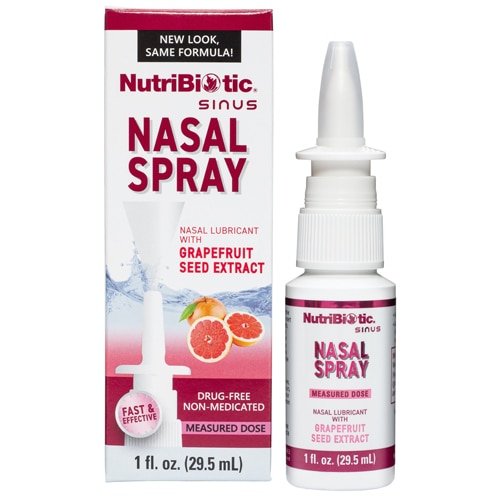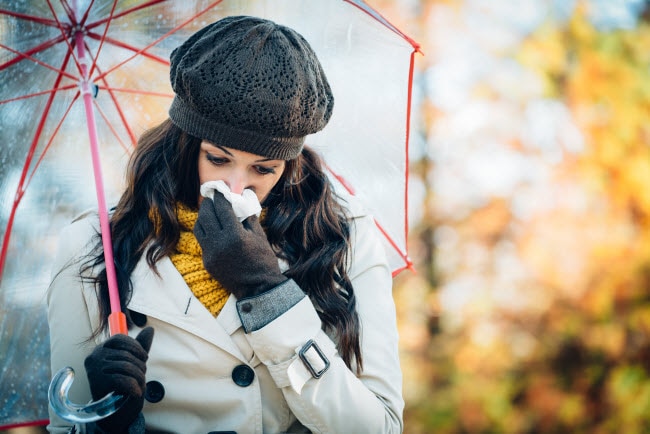Colorful leaves, cooler temps, the return of school, sports, and your favorite shows, the promise of the holidays around the bend—is it any wonder why we’re crazy about fall?
But autumn also arrives with a sense of dread: That we’re all on the verge of contracting the flu or common cold.
Or so it’s normally thought—but is the switch in seasons really the reason behind our stuffy noses, low energy, persistent allergies, and blue moods?
Let’s have a look.
Truth and Myth: Cold weather makes you sick
Chillier temps can be a welcome reprieve after a scorching summer, and yet that respite can feel short-lived because you tend to equate cold weather with automatically getting sick. While Time reports that fall does indeed see the “biggest surge in human rhinovirus infections,” the drop in mercury can’t be blamed—at least not entirely.
“In studies of cold transmission, people who are chilled are no more likely to get sick than those who were not,” The New York Times says. “It may be that cold weather keeps people indoors, where germs are more likely to catch up with you.”
This holds true for the lot of us who live in environments that see temperatures plunge. Time once savored outside in the fresh air is suddenly spent in enclosed spaces—from coffee shops to your family’s living room— and around others seeking warmth. To top it all off, central heating and recycled air—the norm for the fall and winter months—dry out your lungs, eyes and mouth, rendering these points of entry for illnesses all the more vulnerable.
At the same time, while research shows that your body becomes more robust at combatting viral infections in colder weather, the chillier temps inside your nasal cavity might make you less effective at fighting off viruses. Further, physical activity often diminishes during the colder months—and aerobic activity is one of your greatest defenses against illnesses. In other words, your mother may have been right when she told you to keep your nose from getting cold, but it’s more complicated than the mere weather.
Your defense: Natural remedies abound. First, keep your hands away from your face (remember that point of entry?), wash your hands regularly (or use organic, plant-based hand sanitizers), and cover your sneezes and coughs with a tissue instead of your hand. Second, reach for foods that are jam-packed with nutrients, particularly vitamin C-rich foods such as broccoli and tomatoes. Third, get moving even if you come down with cold: A study published by the British Journal of Sports Medicine found that the more participants exercised, the less they reported getting sick. One theory? Aerobic activity may help “recruit a bunch of important immune cells that normally ‘camp out’ in different places in the body, such as the spleen, bone marrow or lymph nodes,” NPR reports.
Truth: Cold weather makes you tired
When the thermometer takes a nosedive, so do you—literally. Chillier temperatures and diminishing sunlight can make you feel far more fatigued than you did in July. Indeed, a study published by Harvard University found that people slept an average of 2.7 hours more per night come October.
Sound delicious? Think again: The quality of sleep shrank, leaving people feeling bleary-eyed the next day. Furthermore, while not getting enough shuteye can be blamed for a cornucopia of problems, so can oversleeping. Technically called “hypersomnia” (that’d be the antithesis of its equally frustrating kin, insomnia), oversleeping may result in diabetes and heart disease, among other major health issues.
Your defense: Researchers have found that exhaustion and oversleeping associated with seasonal changes are due to reduced vitamin D levels associated with less sunshine—and low levels of this essential nutrient can lead to lassitude and lethargy. Aim to increase your vitamin D intake with a supplement and with foods such as eggs, mushrooms, oatmeal, fortified milk (conventional or nut-based) and fatty fish. And if the sun breaks through those clouds? Step outside and relish it—it’ll help get your sleeping patterns back on track (and get you feeling summer-fantastic).
Myth: Allergies disappear in winter
Spring may be readily associated with hay fever for a good cause, but believing you’re good to go during winter may be a huge disservice to your health. In fact, those sniffles that are suddenly sabotaging you from having a great day could actually be due to winter allergies. As MSN reports, “Dust mites, mold or animal dander are still a problem since pets stay inside for longer and windows are closed leading to poorer quality” and “the allergy symptoms may feel like you’re having a sinus infection that won’t go away.”
Your defense: Feeling under the weather? Schedule an appointment with your doctor to determine whether it’s due to allergies or an infection. And if you have a system in place to naturally relieve allergy symptoms—stinging nettle, probiotics, a healthy diet—by all means, keep it in place through fall and winter.
Myth and Truth: Dreary days make you melancholy
We’re all familiar with the winter blues. And yet, as Dr. Kelly Rohan of the University of Vermont says, clinical depression that’s experienced between September and April (and peaks in December, January, and February) involves more than a dearth of sunshine. Researchers have found that Seasonal Affective Disorder (aptly known as SAD) is due to “light and daylight wavelengths not hitting the eyes, which in sensitive people means the brain doesn’t generate enough serotonin (“happy” hormone) and generates too much melatonin, causing all other symptoms,” Rohan says.
Your defense: Turn to your diet first and strive to eat foods that are rich in tryptophan—an amino acid that organically bolsters serotonin. Cottage cheese, yogurt, eggs, turkey, nuts, seeds, salmon and chocolate—yes, chocolate—are all choice options. Exercising outside—even in the cold—will also expose you to natural light; sitting next to a window is advised when you can’t get outside. Cognitive behavioral therapy may be necessary for some, while making a point to socialize—even if you don’t feel like it—will serve as a natural antidepressant. And if all else fails, consider moving to Hawaii (or somewhere else that’s just as warm): The British National Health Service found that SAD cases are rarer among people who call places near the equator home.




